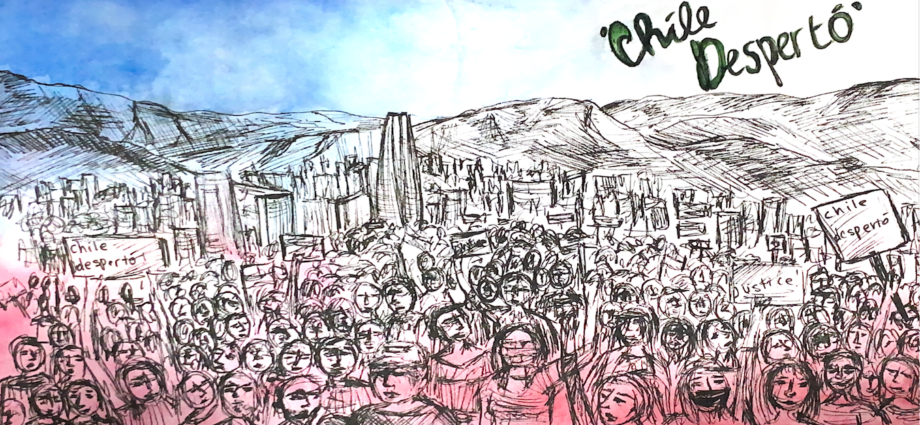Written by Emeline Rateau
My personal experience facing the current Chilean state of politics inherited from Pinochet
As soon as I started exploring the city of Santiago, its walls filled with graffiti caught my attention. They were everywhere, and unavoidable. Every little piece of it screamed for justice. In many different forms. About many different topics. I couldn’t stop looking, as if every detail could tell me more about the culture, the reality of living here.
The irony behind this was that they all seemed invisible to the eyes of the pedestrians. No one would stop to look at the murals. No one seemed to acknowledge their presence. As if everyone was so used to living surrounded by them. As if these struggles had always been present in their lives.
Nevertheless, when I arrived in Chile in August, the population was getting ready for a referendum which aimed to adopt a new constitution. It would replace the one adopted in 1980 under the military dictatorship of Pinochet. This process of rewriting an entirely new constitution had come after the infamous estallido social (eng. lit. social explosion), which started in Chile on the 18th of October 2019. This wave of protests which overtook the country was caused by the increase of the price of the metro ride by 30 pesos (4 euro cents) by who was then Chile’s president Sebastián Piñera.
At first sight, the massive destruction which happened following this measure, and later led to a state of emergency in the country, might sound surprising and excessive. However, as the street graffiti portray:
“no son 30 pesos, son 30 años” (eng. “it is not 30 pesos, it is 30 years”).
The heterogeneity of the complaints revealed years of abuse and division within the country. Not associated with any political party, this social outburst brought back issues that had been ignored for years, and never tackled in the political scene. Indigenous rights, inequality, anti-neoliberalism claims, LGBTQIA+ rights, feminism, universal healthcare, free education, and more.
Despite the variety of demands, what united the Chilean population was their common urge to fight against a repressive state that had oppressed its people for too long. And their union came as a contradiction and opposition to what the country had always been: divided.
Pinochet’s contested legacy
Contrary to what many might think, the legacy of Pinochet’s military dictatorship and its coup d’état against Allende’s regime, the first democratically elected socialist president in Chilean history, on the 11th of September 1973, is still contested in Chile. This division of opinions in the country is representative of its extreme social inequality.
Chilean division starting with the capital city of Santiago
Within the capital city of Santiago, one may experience the different realities of Chile. On the East side of the city, which is a richer neighbourhood, it is less likely to see graffiti demanding more social justice, but rather rechazo posters (i.e. against the new constitution). As a matter of fact, many inhabitants of the East side consider the dictatorship as the best thing that could have happened in Chile. For instance, in the neighbourhood Las Condes, which concentrates sixty percent of the national GDP, the upper class and the businessmen often praise Pinochet and his economic measures for the wealth and power they gave to Chile.
On the other hand, in the more Western side of Santiago, graffiti has become more visible, as well as apruebo signs (i.e. in favour of the new constitution) alongside the reality that comes with it: less safety, less comfort, less justice, more poverty, and more misery. The supposedly good effects of neoliberalism, established under Pinochet’s regime, do not seem to have affected this side of the city, nor its people. In fact, many of its inhabitants refer to the military dictatorship as a dark and traumatic era, when many of their family members disappeared, and simply state that their money was taken away from them to benefit the richest.
One may wonder how can a country live with such a gap regarding the interpretation of a legacy which significantly scarred the country for two decades. This question had not been answered until the 18th of October 2019 , when the population decided to take it to the streets and fight all together for a better future and demand more dignity. It is said: Chile despertó (eng. Chile woke up).
The violence which surged in Chile during the uprising, coming from both the population and the police contributed to exhibiting the extreme division present in the country, and both sides’ realities: the protesters’ desire to wake up in a better Chile (amanecer en un nuevo Chile), and the government’s wish to become a developed country, even if it comes at the expense of its own population. Sebastián Piñera’s declaration that Chile was an oasis in the middle of a Latin America that is struggling politically, months before the social uprising, is a clear depiction of the neglect of the reality behind this apparent development.
Eventually, on the 4th of September 2022, the referendum for a new constitution was nationally voted and rejected with a percentage of only 38,1 percent approving it against 61,9 percent opposing it. Pinochet’s constitution will therefore remain in practice until the next referendum comes up. The victory of ‘rechazo’ came as a surprise in the country after so many efforts to fight for a better future. Nevertheless, this does not mean that it is the end of the social uprising which happened in Chile, but rather the beginning of a slow but steady constitution of a new state of affairs, which could enable more national unity within the country.
Edited by Zuzanna Mietlińska, artwork by Maria Beckers

